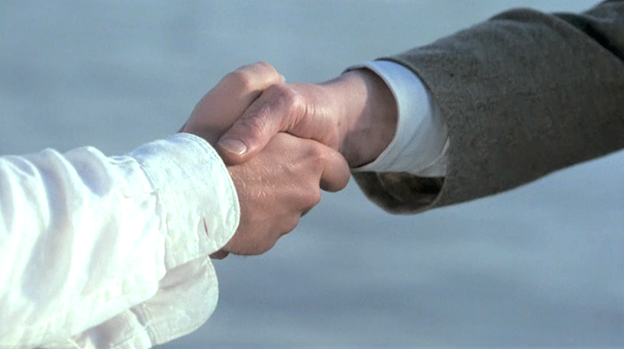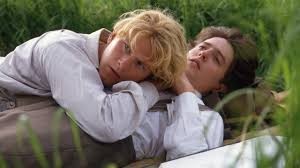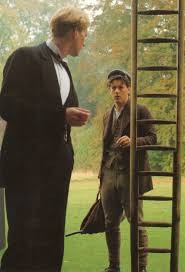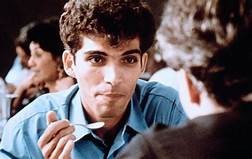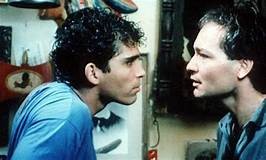fan mail
by Douglas Messerli
Richard Kwietniowski (screenwriter, based on
the book by Gilbert Adair, and director), Love and Death on Long Island
/ 1997
British director Richard Kwietniowski’s 1997
film Love and Death on Long Island was screened in the Un Certain Regard
section of the 1997 Cannes Film Festival and received mostly excellent reviews
when it reached theaters, this despite that it’s a rather odd-ball LGBTQ+ film
in which absolutely none of the characters are clearly homosexual, lesbian,
bisexual, transgender or anything else under the rainbow. In fact, it is
doubtful that the central figure of this film, Giles De’Ath (John Hurt) has
even had sex since the death of his wife several years before the action of
this film begins, and even then he might not have had sex for several years before
his wife died.
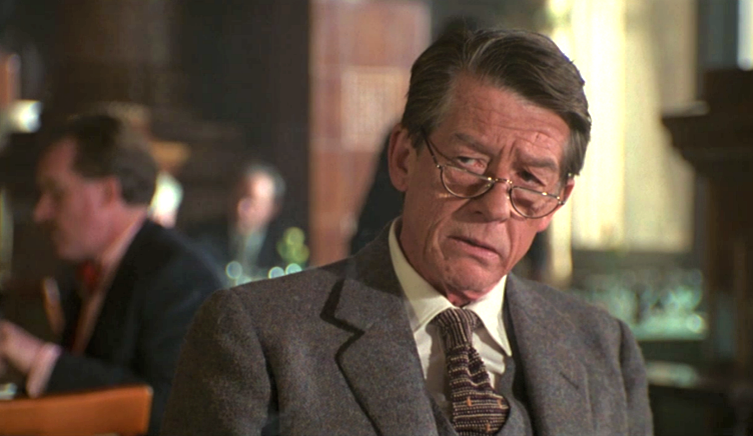
In
a strange way this is a coming out movie without anyone or even reason for
which he might come to accept his newly discovered sexuality. And, in fact, it
is not certain that he is even looking for sex. Giles, a writer of seemingly
rather boring cultural histories that are perfect for people who love to attend
lectures delivered by prudishly polite and intelligent British quipsters of the
elder generation, suddenly falls in love with a young actor of teen films such
as Hotpants College I, II, and III.
Despite the fact that he rarely sees films, his agent has encouraged him
to get out, and Giles had, over his protests, finally decided to take in a film
version of an E.M. Forster novel (most definitely not Howards End, A
Room with a View, or Maurice). His unfamiliarity with modern
multiplex movie houses results in his buying a ticket for the teen fare which,
being absolutely astounded by its stupidity, is about to abandon until he spots
the young actor Ronnie Bostock (Jason Priestley) who plays the one “nice” boy
taunted by the usual bad boys seeking out sex with any woman they can lay their
hands on and desperate to get into trouble. Ronnie, in the first film he
watches, ends up tied to a diner countertop with ketchup poured all over his
body.

So taken is the elderly writer with the handsome young actor that he
sneaks in to see the film soon after, and before long, without knowing anything
about the media devices of the day, buys a VCR player and, when the salespeople
finally make it clear to him that the player needs a machine upon which to see
the image, a TV set, evidently his first.
Before long he is buying up teen magazines and clipping out pictures of
Ronnie like a young teen girl, renting all the movies in which the boy has
performed, and notifying his servant woman that she need not come into his
study to clear any longer. He has almost become a young boy who having just
discovered porn tapes, demands privacy so that he might jack off. We have
utterly no indication that Giles is masturbating, but we do perceive that he
has fallen—
to use the necessary cliche to convey his
state of mind—“head-over-heels” in love with the mediocre teen heartthrob
Ronnie Bostock.
Like a female teenage fan, he discovers everything he can about his
private life, what car he drives, what food he likes, what books he reads, and,
most importantly, where he lives, in this case Long Island near the Hamptons.
When Giles delivers a lecture speaking about the new discoveries he has
made about the role of actors, metaphorical weaving them into some connection
with his previous cultural concerns, his audience is so appalled that his agent
insists that his client take a rest, perhaps travel. And so Giles winds up at a
tacky motel on Long Island without even knowing the term for what he is
involved with, stalking his boy movie hero.
His refined way of speaking and the fact that he is a writer and British
quickly gains him friends with the motel operator and the local restaurant
owner Irv (Maury Chaykin). Literally walking around the Long Island territory
near where he believes Ronnie lives, Giles begins to play detective, but to the
suspicious locals appears more like would-be thief or sexual pervert, the
latter of which he truly has become in his obsession. He chats with the local
mailman, initiates conversations with Irv’s diners, and does everything he
might to find out, without directly bringing up the subject, where a movie star,
whom he knows merely to be a second-rate actor, might live on the island, all with no luck.

Then
suddenly he spots a dog named Springer, the one described in the fan
magazines, and follows its trail, hanging out in front of the house until a
woman finally gets into the car, “the one described in the fan magazines” to go
grocery shopping. Hijacking a taxi he enters the grocery, tossing previously
unknown fast food treats into his basket before crashing into Audrey’s (Fiona
Loewi) grocery cart, Ronnie’s slightly older girlfriend, and by convincing her
that Ronnie is well known and terribly popular in Britain, gains her trust and
friendship, actually being invited over to their house.
Unfortunately, his heartthrob is currently in Los Angeles, but don’t
worry, he’s due back soon. And he’s at the perfect point in his career,
disgusted as he is with playing juvenile roles in teen movies and desperate to
perform as an adult actor in a film with a subject other than how to get into
the girl’s locker room, or in Ronnie’s case how to prevent his friends entry
from that sacred space, he playing always the good boy to their bad-boy
tactics.
When Ronnie returns, things quickly develop as the two, Ronnie and
Giles, appearing to develop a true mentor-young actor friendship, at the very
same moment when Audrey begins to uncover something close to the truth, at
least suspects that Giles’ interest in her boyfriend is not purely that of
simply an elder fan. Yet Ronnie,
after spending an unsuspecting day with a man
who wants to become his lover touring him through the Hamptons, is almost sold
on the idea that the writer might create a new serious-minded script for him.
There is a moment as the two stand upon the beach that we realize this
film actually has the potential of becoming a kind of Long Island version of Death
in Venice, with Giles dying for love while the unwitting Ronnie skips along
the strand with his dog Strider. But Giles, unlike Gustav von Aschenbach is no
silent admirer, and the slightly chubby-faced Ronnie is no longer a teenage
beauty like Tadzio.
The trouble is, of course, that Giles, without perhaps even realizing
it, wants the Ronnie of the movies, the latent teenager with whom he’s fallen
in love, and amazingly is already busy plotting a way into his heart and a
route in which to lure Ronnie into his bed, or at least into his book-lined
British study.
The
film has suddenly become “vaguely creepy” as film critic Mark Caro of the
Chicago Tribune puts it, while at the same time, without our
really knowing it, that it has truly become a touching love story, with the two
men holding out their hands to one another in deep friendship—a gesture we
realize may be the only sign of real affection that Giles receives for his
absurd adventures “on the road.”
To end the farce, Audrey secretly plans a trip to Vermont with Ronnie to
meet his family before they both move back to California where Ronnie is
scheduled to film yet another rewind of Hotpants College.
In desperation, Giles takes his young man to breakfast and in a manner
that surely has never been put to film before, proposes to him, not marriage of
course, but the kind of marriage he can imagine might lure the boy into his
home: an offer to become his agent in England so that he might arrange an
entirely new film career for him in a Europe that is not only more open to
producing
the unsuccessful art films which Ronnie longs
to make, but doesn’t blink an eye on younger/older liaisons such as Giles
suggests were those between Rimbaud and Verlaine—which registers in Ronnie’s
American Pie pea brain as “Rambo.”

Nonetheless, he begins to see that what Giles is suggesting is utterly
impossible if not total nonsense, forcing the elderly writer who has clearly
lived a life of cautiousness, to openly reveal that he truly is in love with
him. Ronnie, fortunately, is a good boy and does not fall into a homophobic
rage, but is shaken nonetheless, standing up finally to wish his would-be lover
goodbye for one last time. If I were the director I might have allowed him a
kiss on the cheek. But Giles has nothing left.
Having never before even known that was such a thing as a FAX machine,
Giles makes one last desperate pitch, writing to tell him that someday if he
reads the full letter of several pages the elder has written, he will secretly
retain it and read it over again and again knowing that he perhaps made the
wrong decision at a crossroads in his life.
Ronnie, having indeed read the whole letter, begins to tear it up. But
suddenly rips out a single page wherein Giles has written a special scene for
the script for the movie in which his boyfriend is about appear. His mother
having died, Ronnie’s character reads a poem at the burial, lines from Walt
Whitman, “Now, Voyager, sail thou forth, to seek and find."
The scene indeed makes it into the final film, surely without Ronnie
ever discovering who Walt Whitman truly was, a gay man speaking of love, nor
perceiving that the words were truly directed at him instead of the fictional
mother in her grave.
In a sense, accordingly, Giles has greatly benefited from his perverse
love affair, having brought himself out into the modern world, effecting a
small change in a terribly mediocre script, and perhaps even registering in
Ronnie’s consciousness a tiny blip of regret, if not now perhaps at time later,
in Ronnie’s mind and heart for not having taken a chance for something
completely different when it was offered.
Just
as we know Giles will never find someone again with whom he might even imagine
living his life with, so too are we certain that Ronnie has no career ahead in
serious filmmaking, and probably only a year or two, if that long, of further
teenage roles. If Giles’ adventure is over, so too is Ronnie’s, their lives
both having reached a road-block for which there is no way around, although
youth is still on Ronnie’s side. Surely he will become like so many used-up
cute-boy and girl actors before him a bit player, a real estate agent, a car
dealer, a restaurateur like Irv.
Perhaps Giles will write
on what he learned about love and publish yet another book.
But neither of them perhaps will ever again have the chance to
experience such a beautifully queer love.
Los Angeles, December 18, 2021
Reprinted from World Cinema Review (December
2021).









